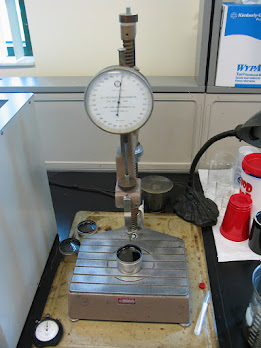Different types of Bitumen test in construction
Bitumen, a crucial component in road construction and other infrastructure projects, undergoes various tests to ensure its quality and suitability for specific applications. Here are some common types of bitumen tests conducted in construction projects:
Penetration Test:
- Measures the hardness or softness of bitumen.
- Involves measuring the depth (in tenths of a millimeter) to which a standard needle penetrates the bitumen sample under specific conditions of loading, time, and temperature.

Penetration Test Softening Point Test:
- Determines the temperature at which bitumen softens.
- The softening point is the temperature at which a bitumen sample can no longer support the weight of a steel ball under specified conditions.
Ductility Test:
- Measures the bitumen's ability to deform without breaking.
- Involves measuring the elongation of a standard briquette of bitumen at a specific temperature and pull rate.
- Ductility Test
Flash and Fire Point Test:
- Determines the temperature at which bitumen releases flammable vapors.
- Flash point is the temperature at which a small flame is produced, while fire point is the temperature at which sustained combustion occurs.
Specific Gravity Test:
- Measures the density of bitumen.
- It is the ratio of the weight of a given volume of bitumen to the weight of an equal volume of water at a specified temperature.
Viscosity Test:
- Evaluates the flow characteristics of bitumen.
- Various tests, such as the Saybolt Furol Viscosity test or the Brookfield Viscometer test, are conducted to measure the viscosity of bitumen at different temperatures.
Float Test:
- Determines the purity of bitumen.
- Involves immersing a sample of bitumen in a solution and observing whether it floats or sinks, indicating the presence of impurities.
Purity Test:
- Assesses the presence of impurities in bitumen, such as water, organic matter, and mineral matter.
Solubility Test:
- Determines the solubility of bitumen in a solvent, providing information about its composition.
Thin Film Oven Test (TFOT):
- Simulates the aging process of bitumen during mixing and laying.
- Involves exposing a thin film of bitumen to high temperatures and airflow to assess its aging characteristics.
Rolling Thin Film Oven Test (RTFOT):
- Similar to the TFOT but involves rolling thin films of bitumen on a metal cylinder to simulate the effect of compaction during mixing and laying.
These tests help ensure that bitumen used in construction projects meets specified standards and performs well under various conditions, contributing to the longevity and quality of the infrastructure.



Comments
Post a Comment